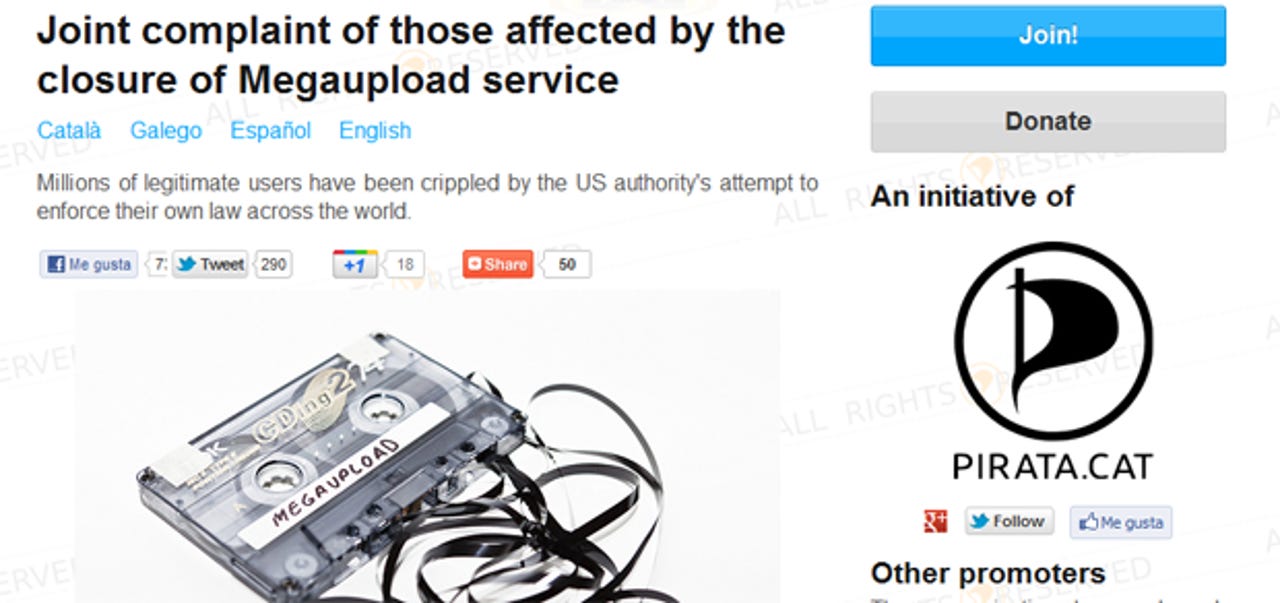The Pirate Party: Justice for legitimate ex-users of Megaupload

Just a few days after the majority of the tech community were sitting smugly over coffee watching headlines confirming the temporary defeat of SOPA, Megaupload disappeared overnight from the digital radar.
After the FBI took it upon themselves to close down the storage locker, seize the domain names, confiscate over $50 million in assets and arrest the founders, the rage and confusion of users was felt worldwide.
Now, a movement has begun in Catalonia from the Pirate Party (PP-Cat) that aims to bring collective civil action against the FBI.

On the first day, over 1000 ex-megaupload users registered in Spain alone, and now collective anger is branching out due social media communication. If you surf the hashtag #megacomplaint on Twitter, you can see the campaign is gaining a degree of momentum.
Support has also flooded in from other Pirate Parties across the world -- including the Czech Republic, Russia, UK and Sweden. The campaign's website expresses anger at the 'millions of legitimate users have been crippled by the U.S. authority's attempt to enforce their own law across the world.'
Sounds familiar, doesn't it?
By using the campaign website and social media links, users that have lost files which may well be legitimate can join the 'movement', make donations, voice their complaints and read the manifesto.
PP-Cat says that the FBI has potentially violated Articles 197 and 198 of the Spanish Penal Code by misappropriating personal data, and further than the takedown being an illegal action, it has caused disruption and damage on a global scale in a 'fruitless' attempt to clamp down on copyright theft under U.S. law:
However, as much of the unlawful content will still be available via other services on the web, this action not only shows us the futility of these measures but also serves as a reminder that these files are not necessarily, nor have been shown to be, illegal in any country, including the U.S.
So, in the case of Megaupload, U.S. authorities decide to close down the service on the basis of suspicion of copyright infringement under debatable legal avenues. If the law in one country can take down global services as they please, was there a point to so many attempting to stave off a bill which gave authorities the power to do such a thing?
PP-Cat, in conjunction with various Pirate Parties across the world, plan to investigate these potential breaches of law and will 'facilitate submission of complaints against the US authorities in as many countries as possible, to ensure a positive and just result.'
Andrew Robinson, Pirate Party UK Culture Media & Sport Spokesperson, supports the effort -- saying:
"We believe that the rights of ordinary people are being ignored by those intent on maintaining a flawed business model via excessive legislation. We believe that unjust laws like SOPA, PIPA and now ACTA must be fought, and that ordinary internet users should have legal recourse against the copyright lobby."
The movement is not about applauding online piracy. It is about giving legitimate users a platform to attempt to defend themselves from authorities that overstep the mark:
Regardless of ideology, or opinions on the legality or morality of those running Megaupload, actions such as the closure of this service cause huge damage to lawful users of the sites and are unacceptable and disproportionate violations of their rights.
Sure, Megaupload was a prime target to be taken down to leave music labels slavering at the mouth -- but as ZDNet's Steven J.Vaughan-Nichols noted, only a small percentage of illegal file-sharing takes place through cyber storage-lockers. BitTorrent services are, and probably will be for the foreseeable future, the easiest and most popular method of file-sharing.
It seems like scaremongering more than anything, as many similar storage services have already fled to the hills or banned users from the U.S. to stave off their own ruin. However, it won't make a blind bit of difference to those who pirate -- it will probably affect legitimate storage users far more.
Image credit: PP-Cat
Related: